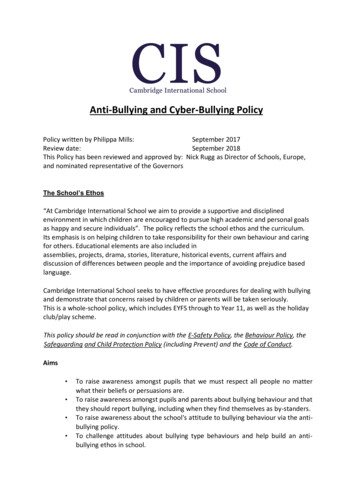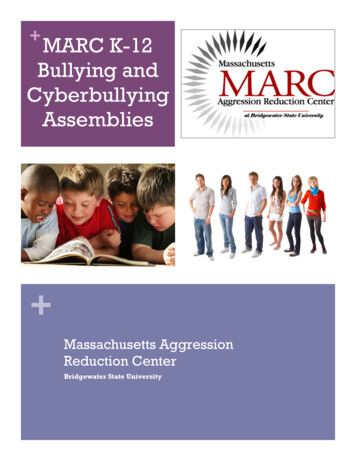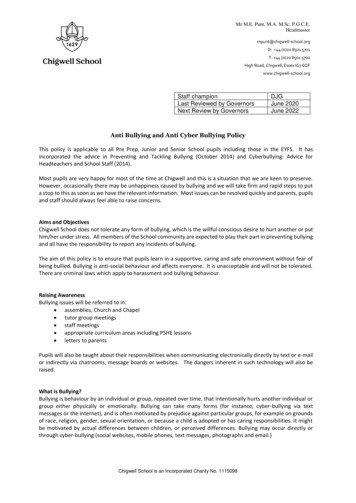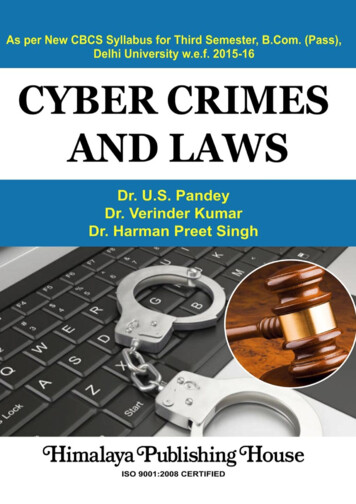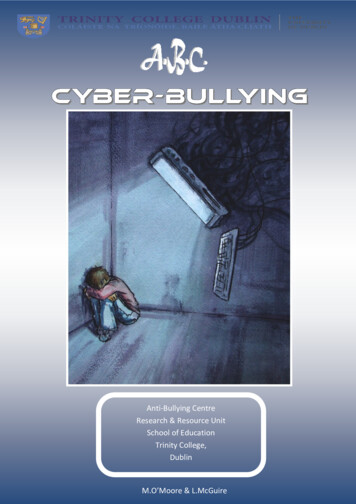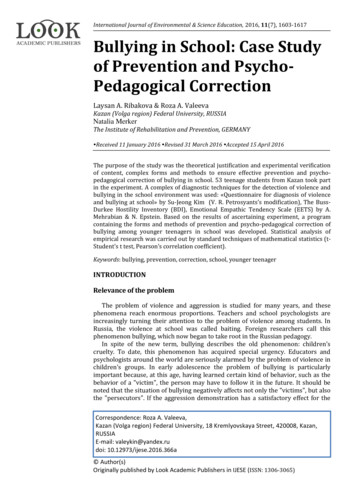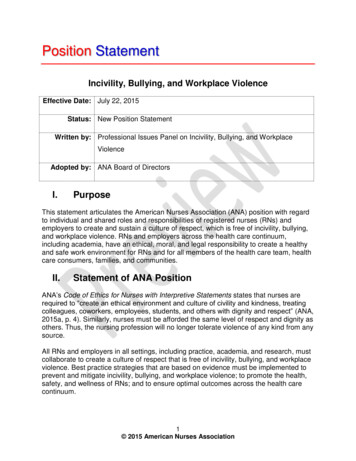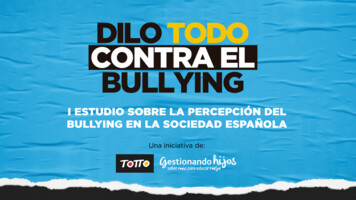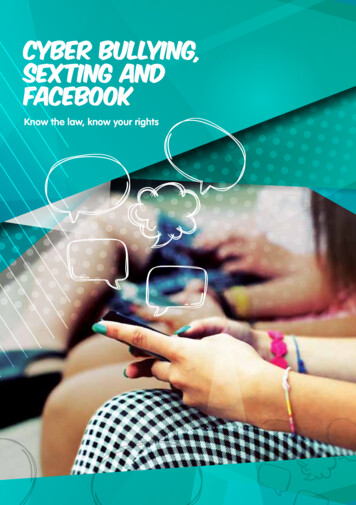
Transcription
Cyber bullying,sexting andFacebookKnow the law, know your rights
2Cyber bullying, sexting and Facebook
Contents4Cyber bullying10 Sexting14 Facebook17More information18 Useful websitesDisclaimerThis guide is intended to provide you with information only. If you have a legal problem, you should getlegal advice from a lawyer. Legal Aid Queensland believes the information provided is accurate as atMay 2016 and does not accept responsibility for any errors or omissions.We are committed to providing accessible services to Queenslanders from all culturallydiverse backgrounds. If you would like this publication explained in your language, pleasetelephone the Translating and Interpreting Service on 13 14 50 to speak to an interpreter.Ask them to connect you to Legal Aid Queensland. This is a free service.Know the law, know your rights3
Cyber bullyingWhat is cyber bullying?Cyber bullying is intentional and repeated cruel or hurtful behaviour that iscarried out using technology, such as: SMS or text messagesemailblogschat rooms discussion boardsinstant messagingonline gamesphoto sharing apps, eg Snapchat and Instagramsocial networking sites and apps like Facebook, Twitter and Ask.fm.Cyber bullying can include: sending cruel and threatening messages or materialputting embarrassing photos of people on the webcreating fake profiles that are mean or hurtfulsending unwanted messages online, teasing and making fun of others.A cyber bully can be someone you know or a stranger.4Cyber bullying, sexting and Facebook
Is cyber bullying illegal in Queensland?Yes. Cyber bullying is a crime if it involves using the internet or a mobile phone to: make threatsthis can include trying to intentionally frighten, intimidate or annoy someoneby threatening to hurt them; it is also illegal to threaten to enter or damagea property stalk someonestalking is when someone gets repeated attention that frightens orintimidates them menace, harass or seriously offend someonethis can include sending offensive messages or making posts that makesomeone feel extremely angry, outraged, humiliated or disgusted.Know the law, know your rights5
How do I stop cyber bullying? Don’t give out your private information like passwords, names, addresses,phone numbers, school names, photos or family information online to peopleyou don’t know or trust. This information can be used by bullies and others toharm you. Don’t exchange photos or give your email address to people on the internetyou don’t know or trust. Don’t send messages when you’re angry. This can start a heatedconversation that may lead to bullying. Don’t reply to messages from a bully. Bullies will often get bored and stoptheir behaviour if you don’t respond. Leave a chat room or instant message service immediately if you arefeeling harassed. Block the person so they can’t contact you. Use caller ID blocking to hide your phone number when making calls. Don’t leave your name on your voicemail. Report the bully. You can anonymously report the bully and if the bully hasbreached a website’s terms and conditions their account may be disabled. Take a screenshot to keep as evidence of the bullying.6Cyber bullying, sexting and Facebook
What should I do if I am being cyber bullied?Tell someoneNobody should have to deal with bullying alone. Tell a trusted adult, like a parent,teacher, school counsellor, family friend, or even an older brother or sister.If you need to talk to someone you can also call Kids Helpline or Lifeline. You cancall them anytime—they are available 24 hours a day, seven days a week.Kids HelplinePhone: 1800 55 1800Visit www.kidshelp.com.au to talk to a counsellor online or by email.LifelinePhone: 13 11 14Stop the activityPeople who bully get their kicks from knowing they’ve upset the person they’rebullying. If you don’t let them know they’ve upset you, you will have taken awayhalf of their fun and they are more likely to stop.Block the sender’s messagesIf you are being bullied through email or instant messaging, block the sender’smessages. Never reply to harassing messages.Know the law, know your rights7
Tell your schoolIf you are being cyber bullied by someone in your school, let a teacher, counselloror your school principal know. Schools must provide a safe, supportive, disciplinedlearning environment for students—bullying is not tolerated. Schools havediscipline policies, guidelines or codes of conduct to prevent or deal with anycyber bullying behaviour.You can also report online harassment and physical threats to your local policeand your Internet Service Provider.If you are being bullied by text messages you may need to change yourphone number.What should I do if my school has not been able to stop the bullying?You can call the Department of Education and Training’s regional office for yourarea and ask to speak to the manager responsible for your school. Go html to look up contact detailsfor the regional office in your area. Tell the regional office manager you want to makea cyber bullying complaint that was not resolved by your school.If the Department of Education and Training does not do anything, then youcan make a complaint about the department and your school’s inaction tothe Queensland Ombudsman. Call the Office of the Queensland Ombudsmanon 1800 068 908 and tell them you want to make a cyber bullying complaint thatwas not resolved by your school or the Department of Education and Training.You can also make a complaint online on the Queensland Ombudsman’swebsite: www.ombudsman.qld.gov.au8Cyber bullying, sexting and Facebook
Do I need to talk to a lawyer?Bullies can be very persistent, but if a bully receives a letter from a lawyer or iscontacted by the police this will often bring an end to their bullying behaviour.If the bully receives a letter from a lawyer this can also bring parents (and schools)into line by encouraging them to take complaints seriously and more closelysupervise the bully’s activities.Did you know in many cases cyber bullies can be sued for defamation or forinflicting emotional distress on someone? They may also be charged with variouscomputer crimes.Legal Aid Queensland or a community legal centre can help you understand yourlegal rights if you are being cyber bullied. Call Legal Aid Queensland or acommunity legal centre to get free legal information or advice about your situationand find out your options. These services are free for people aged 17 and under.Legal Aid QueenslandPhone: 1300 65 11 88 (cost of a local call from a landline in Australia)Community legal centresTo find out where your closest centre is, call Legal Aid Queensland on 1300 65 11 88or visit the Legal Aid Queensland website www.legalaid.qld.gov.auKnow the law, know your rights9
SextingWhat is sexting?Sexting usually refers to: taking naked or partially naked photos or videos of yourself (posing in asexual way) and sending the photos via the internet or mobile phones receiving or forwarding naked or partially naked photos or videos throughmobile phones, internet and social networking sites such as Facebookor Instagram.Sexting can include images from film, movies, videos, photos, and digital imagessent by SMS, email, chat rooms and publishing on blogs.Is sexting a crime?Yes. It is illegal to create, send, possess or intend to possess images of someone aged(or who appears to be aged) under 18 (including yourself) who is: involved in a sexual activityin a sexual poseacting in a sexual wayshowing their sexual parts.10Cyber bullying, sexting and Facebook
If you make, send or possess illegal sexting images to other people you may becharged with ‘distributing child exploitation material’ which is a serious crime.If you are found guilty of this offence you could be sentenced to up to seven years in jailif you are aged 16 or under, or 14 years in jail if you are aged 17 or older.You will not get into trouble if you were sent sexting images without asking for themand you deleted the images as soon as you could.Can a child be convicted of a sexting crime?Yes. If you are aged 10 or older you can be charged with a criminal offence forpossessing ‘child exploitation materials’.What should I do if I have received a photoor video?If you receive images over the internet or on your mobile phone that contain nakedor partially naked photos or videos of another person posing in a sexual way: Delete the images immediately. Tell the person to stop sending you images and tell a trusted adult (such asyour parents, a teacher or school counsellor) about the images. If the person continues to send you images, report them to the police. Don’t forward these images onto other people as you may be charged withdistributing child exploitation material.It is important to respect other people’s choices and their right to privacy and dignity.Know the law, know your rights11
What are the dangers with sexting?One of the dangers with sexting (apart from it possibly being a crime) is that photosor videos of you can be easily distributed without your knowledge or control.If you post images or video of yourself or another person online, there is no wayto guarantee other people won’t be able to access it. You may not be able tocontrol who sees the photos or videos. If in doubt, do not post.It is completely normal to want to express your sexuality, but it is important youdo so in a way that is safe. You need to be aware of all the possible consequencesof your actions if you share images of yourself online: Other people may view the images differently and you may become the targetof verbal or even physical abuse. You may only be sending the image to your closest friend/boyfriend/girlfriend,but consider what would happen if their phone was stolen or their email accountwas hacked—your images can be forwarded onto many more people. If you break up with your boyfriend/girlfriend, they might share your picturewith other people. How would you feel if your family, teachers and friends were to receive thosepictures? If you feel uncomfortable then it is best not to take the photo. If your images are available on the internet, an employer may be able toaccess these images. This may have an impact on you being able to geta job in the future. Predators on the internet may be able to access your images.12Cyber bullying, sexting and Facebook
How can I prevent my photos getting intothe wrong hands? Keep your phone, internet and social media usernames and passwords secret.You should change your passwords regularly. Do not upload sexting images or videos of yourself online. Ask yourself “Can I trust the person I am sending my photos to?”. This isimportant because once you send the photos to someone you cannot controlwho they forward them on to. Only accept friend requests from people you know. Review your privacy settings often.Someone has shared a private photo of me.What can I do?If someone has shared a photo of you without your consent, there are a numberof things you can do: If the image is on a social networking site like Facebook, you can reportthe image to Facebook and ask for it to be removed. Talk to someone you trust—a parent, friend, school counsellor or teacher. If the images are being spread without your consent, you should contactthe police.Know the law, know your rights13
FacebookIt’s important to remember that any information, photos or videos you post onFacebook might be copied, pasted, shared and distributed to other people.Before you post, ask yourself “how would I feel if this content was shared widelyat school or with my future employer?”.Someone is abusing me on Facebook.What can I do?If you receive abusive or offensive messages, photos or posts on your Facebookprofile page you can: unfriend the person to remove them from your friend list block them so they can’t contact you save evidence of the abuse by taking a screen shot or print screen of themessage so you can show a trusted adult (such as your parents or a teacher) report the abusive content to Facebook and include the screen shot as evidenceof the abuse.Facebook will remove content that doesn’t follow its terms and conditions(eg nudity, bullying, graphic violence, spam). Use the ‘Report’ link near the photoor post to report the abusive or inappropriate content to Facebook. Reporting isconfidential so no one will know who made the report.Facebook will review the reported material and remove anything that violatestheir Statement of Rights and Responsibilities. If warranted, they will also warnthe person responsible and could even disable their account.You should also review your privacy settings to control who can see yourprofile and posts.14Cyber bullying, sexting and Facebook
I have seen inappropriate content on Facebook.What can I do?Nudity, hate speech, threats, graphic violence, bullying and spam are not allowedon Facebook. If you see any inappropriate content (eg a photo, video, post, page,group or event) on Facebook you can: send a message to the person responsible for posting whatever is botheringyou and ask them to take it down edit your news feed to hide the person’s content unfriend the person to remove them from your friend list block the person from contacting you report the inappropriate content to Facebook use privacy settings to control what you see and how much informationyou share make sure your age is set to your real age. The ads you see on Facebookare tailored to you, based on the age you list on your profile.Someone has created a fake account thatis pretending to be me. What can I do?Facebook does not allow people to create fake profiles to imitate real people.If someone has created a Facebook account pretending to be you, you can reportthis fake account to Facebook.As Facebook’s layout and menu content changes over time the best way to findout how to report a fake account is via the ‘Help’ section.Click on the ‘Help’ link at the bottom of the Facebook homepage. In the searchfield type ‘fake account’. The search results will provide instructions on how to reporta fake account.Know the law, know your rights15
How do I report a fake account if I am noton Facebook?If someone created a Facebook profile pretending to be you and you don’t havea Facebook account, you can still file a report with Facebook:1. Go to the Facebook website www.facebook.com2. Click on the ‘Help’ link at the bottom of the Facebook page.3. In the search field type ‘fake account’. The search results will provide instructionson how to report a fake account to Facebook. Follow the instructions provided.Remember, reporting is confidential, so no one will know who made the report.How do I control who sees my Facebookinformation?Use your privacy settings to control who gets to see your posts and timeline.You can also specify privacy for a specific message or post, and control howmuch information you share with applications (such as games and quizzes).To check your privacy settings, click ‘Account’ at the top of any page and select‘Privacy Settings’ in the dropdown menu that appears.16Cyber bullying, sexting and Facebook
More informationThe Advocacy & Support Centre (TASC)223 Hume St Toowoomba QldPhone: 1300 008 272 or 07 4616 9700www.tascinc.org.auPhone: 1300 65 11 88www.legalaid.qld.gov.auLegal Aid Queensland has 14 officesacross Queensland. Visit the websiteto find your nearest office.www.communitylegalqld.org.auTo find out where your closest communitylegal centre is visit the Community LegalCentres Queensland website.Phone: 1800 55 1800www.kidshelpline.com.auPhone: 13 11 14www.lifeline.org.auPhone: 1800 012 255 (24hrs, 7 days)www.atsils.org.auATSILS has offices acrossQueensland. Visit the website tofind your nearest office.Know the law, know your rights17
Useful websitesThere are lots of good websites that explain how to be cyber smart. Have a look orgYour notes18Cyber bullying, sexting and Facebook
Know the law, know your rights19
April 2015This booklet was developed by The Advocacy & Support Centre with assistance fromthe Legal Aid Queensland Community Legal Education Collaboration Fund.
If you receive images over the internet or on your mobile phone that contain naked or partially naked photos or videos of another person posing in a sexual way: Delete the images immediately. Tell the person to stop sending you images and tell a trusted adult (such as your parents, a teacher or school counsellor) about the images.
